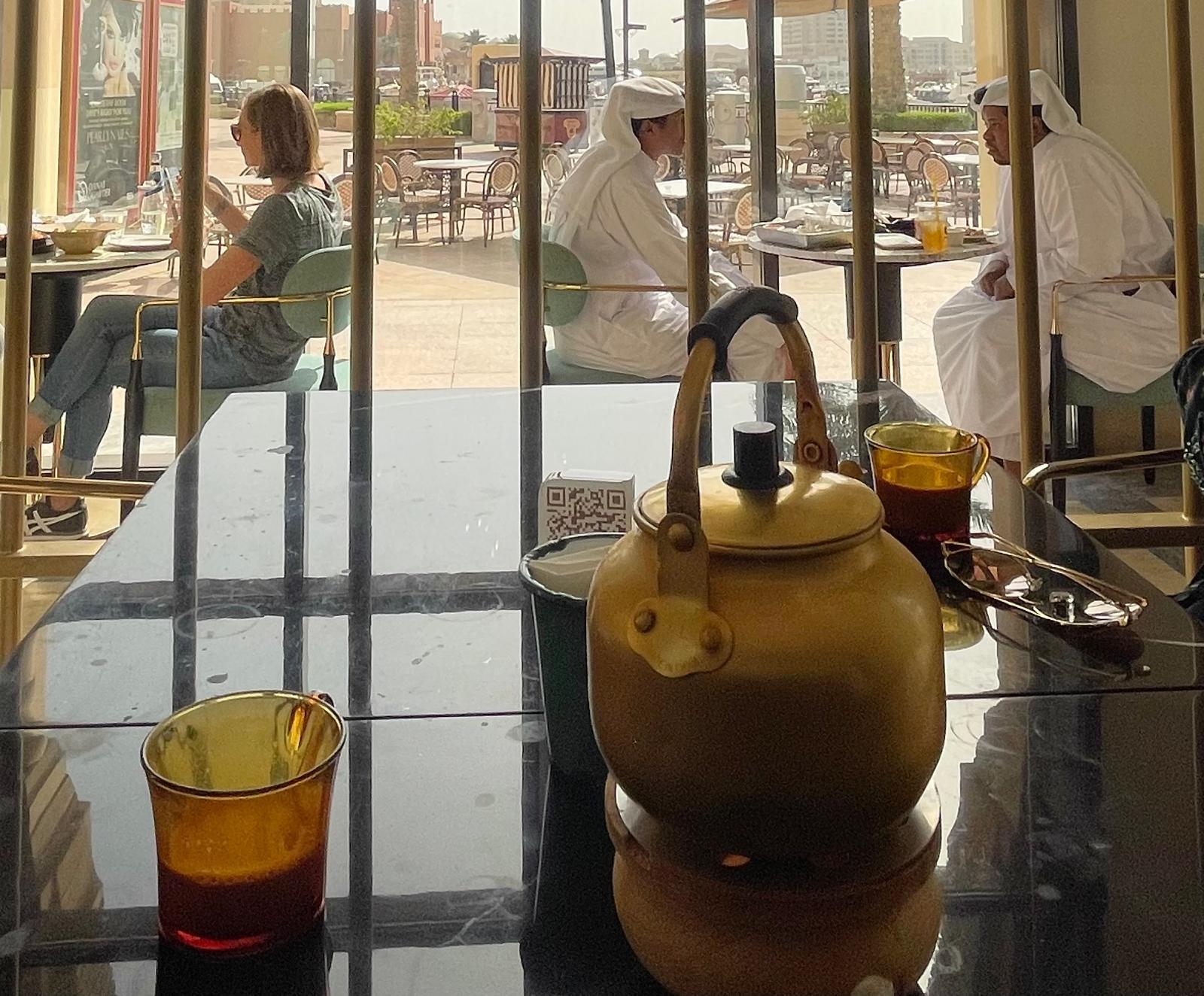In the sweltering heat of Qatar, Mariam (not her real name) made the spontaneous choice to join me for a cup of tea. We planned to meet at the Pearl, nestled in Doha’s esteemed West Bay. The afternoon sun blazed brightly overhead, and the breeze from the Persian Gulf offered little respite from the persistent heat on the artificial island.
Mariam’s haunted eyes told a story of resilience and heartbreak, which she carried from the blood-stained corridors of the American University of Afghanistan (AUAF) to the scorching deserts of Qatar, where she works and studies now.
Vividly recalling the deadly attack on AUAF that claimed the life of her favorite law professor, Naqib Ahmad Khpulwak, among others, and left many with lifelong injuries and scars, Mariam’s hands started trembling.
“All of us had a secret crush on him,” she said softly, her voice trailing off. “His classes were always exciting; he was smart and respectful.”
Reportedly, on the evening of August 24, 2016, at around 7 p.m., a car loaded with explosives was driven up to the university’s fortified security wall and detonated, creating a large hole. Through this breach, a number of gunmen entered and began moving from room to room, shooting at students, faculty, and staff they encountered.
Apparently, the aim of the attackers was to inflict as many casualties as possible before government forces and their international allies could respond to the scene, and end the almost nine-hour siege.
“In fact, I was supposed to be killed too,” Mariam said. She narrowly escaped death because she had left the class for the mosque on campus to offer the evening prayer, moments before the mayhem began.
She wept, then quickly collected herself, gazing pensively at the bright city lights. “It was an ugly war,” she reflected, her voice laden with sorrow. “We sacrificed our hearts and souls. It was unbearable, yet we endured. We survived. Others weren’t so fortunate. I am glad the conflict is over.”
The attack, though unclaimed officially, pointed many fingers at the Taliban, whose presence in Doha, Mariam noted, served as a stark reminder of Afghanistan’s turbulent political landscape amid international sanctions and diplomatic isolation. The Taliban’s political office, situated not far from where Mariam and I met, was officially inaugurated in 2013 on the outskirts of Doha. It functions as a diplomatic liaison for the Taliban at a time when its government faces extensive sanctions, with no other government formally recognizing the Taliban’s Islamic Emirate in Afghanistan.
In the nearly three years since the Taliban took power in Afghanistan, Doha has hosted two major U.N.-led meetings about the country. A third of the series is scheduled for June 30 and July 1.
Mariam said that she was hopeful despite the challenges, adding, “I would choose a hundred years of negotiations over a single day of conflict any time.”
Despite ongoing security challenges, sporadic explosions, and the persistent threat from the Khorasan branch of the Islamic State, most Afghans believe the security situation has largely improved since the era of near-daily fighting between the Taliban and U.S.-backed Afghan forces. Still, the fear of a return to full-fledged war is lingering over Afghans.
After the fall of the Afghan government in 2021, most international aid organizations withdrew from the country. This was partly due to the Taliban’s swift imposition of stringent policies, including restrictions on education for Afghan girls beyond grade six and severe limitations on women’s employment, and has led to extreme poverty and unemployment.
Yet that withdrawal disregarded the urgent need for assistance for millions of Afghans, including women and children. A World Bank report in January stated that “half of Afghanistan’s population lives in poverty, with 15 million people facing food insecurity.”
The Taliban’s failure to adequately address significant human rights concerns has contributed to Afghanistan remaining under global sanctions, with its central bank assets frozen, adding an additional layer to the extreme poverty and a pervasive sense of helplessness in the country that is practically blocked from the rest of the world. Today, Afghans live under a government with no global recognition and no representation in the United Nations.
These developments offer the context of the international meeting in the Qatari capital from June 30 to July 1, where representatives from the Taliban’s Islamic Emirate will meet face-to-face with foreign diplomats and special envoys in a U.N.-led event. This unprecedented decision comes amid international scrutiny over their governance, which is characterized by stringent policies and human rights concerns.
The Taliban’s participation could be an interesting development; it marks a significant shift from their previous stance of boycotting such meetings.
“The agenda and participation list of the upcoming Doha meeting shared with the Islamic Emirate after two months of discussions with the U.N., it was decided in principle to participate in the said meeting. If there are any changes to the agenda and participation, it would naturally affect our decision which we will share with all sides at that time,” the Taliban’s Ministry of Foreign Affairs said in a statement that was shared on X.
The Taliban refused to participate in the last Doha conference, held in February 2024, after the United Nations invited Afghan diaspora groups and civil society organizations, including women’s rights activists, to attend. The U.N. secretary general complained at the time that the Taliban’s “conditions” for attending “denied us the right to talk to other representatives of the Afghan society.”
At the time, the U.N. downplayed the significance of the Taliban boycott, but it has apparently reversed course. Amid a wave of criticism, the U.N. confirmed that the upcoming meeting will not address Afghan women’s rights and will not include representatives from civil society, women, or human rights defenders, which was apparently a prerequisite for Taliban attendance.
The move was widely criticized. Former Human Rights Watch executive director Kenneth Roth wrote on X: “What is happening in Afghanistan is the most serious women’s rights crisis in the world… The idea that the U.N. would convene a meeting with them and not discuss women’s rights or have Afghan women in the room is beyond belief.”
Nevertheless, it is undeniable that the Taliban currently rule Afghanistan, determining the fate of nearly 40 million people – men, women, and children – many of whom face imminent starvation.
Roza Otunbayeva, the head of the U.N. Assistance Mission in Afghanistan, emphasized the importance of the international community engaging in direct dialogue with the Taliban.
Speaking to journalists in New York after attending a U.N. Security Council meeting about Afghanistan, Otunbayeva suggested that such engagement could create opportunities for Afghan women to participate in future talks.
“This is what is possible today… It is a process. Let’s start to speak,” she said.
Given the cautious approach to dialogue and diplomacy from all sides over the past nearly three years, significant breakthroughs from the two-day discussion are unlikely; however, it could lay the groundwork for future debates and serve as a platform for dialogue among the various stakeholders in Afghan affairs.

Having tea with Mariam at a Pearl café in Doha, Qatar.
Despite the bleak outlook, Mariam remains cautiously optimistic about the future of her country as long as dialogue continues. Acknowledging the complexities of engaging with the Taliban, she emphasized the necessity of paving the way to break the stalemate that she believes suffocates Afghan civilians, including her family and friends.
Mariam’s belief in the efficacy of continued meaningful negotiations and economic reconstruction echoed the sentiments of the late Graciana del Castillo, an esteemed economist who extensively studied Afghanistan.
In her book, “Guilty Party: The International Community in Afghanistan,” del Castillo emphasized how the international community’s misguided policies and wasteful aid contributed to Afghanistan’s notorious cycle of conflict. Del Castillo, visiting the country in 2011, underscored the urgent need for sustainable peace efforts through the development of the local economy and the fostering of dialogue.
Del Castillo, a former professor at Columbia University who passed away in 2019, before the U.S. withdrawal and the Taliban takeover, criticized the international community for heavily investing in “misplaced” priorities, such as excessive spending on Afghanistan’s security forces. In a 2014 interview, she argued that this approach created institutions that were unsustainable.
Instead, she emphasized the need for greater emphasis on negotiations with the Taliban and stressed the importance of developing a plan to integrate combatants into a framework that promotes peace. As a possible model, she cited the example of El Salvador and its controversial plan of reintegrating militants through land distribution, efforts made during the peace process following its 1979–1992 civil war.
Del Castillo’s insights highlighted the complexities and critical importance of economic measures in ensuring sustainable peace and the economic dimensions of post-conflict recovery. She argued that the world needed to rethink Afghanistan, and return to basics, help Afghans build their local economies, and reduce the country’s heavy dependence on foreign aid.
Five years after her death, her words still resonate: The world needs to rethink Afghanistan. A conflict of half a century cannot be fixed by sporadic and reluctant diplomacy, sanctions, and isolation that enhance poverty, helplessness, and desperation.
Sipping her tea in Doha, Mariam reflected on Afghanistan’s plight and the international community’s role, the sudden withdrawal of aid organizations post-2021 and the Taliban’s strict policies – all of which exacerbated poverty and despair, leaving millions in dire need.
As we talked, a herd of camels – a tourist attraction – was passing by the towering buildings of the luxurious Pearl Island. Mariam pointed at the herd to make her final point.
“We’ve endured five decades of conflict,” she stated thoughtfully. “If peace requires the patience of a camel, I’m willing to wait. It’s worth it.”

































